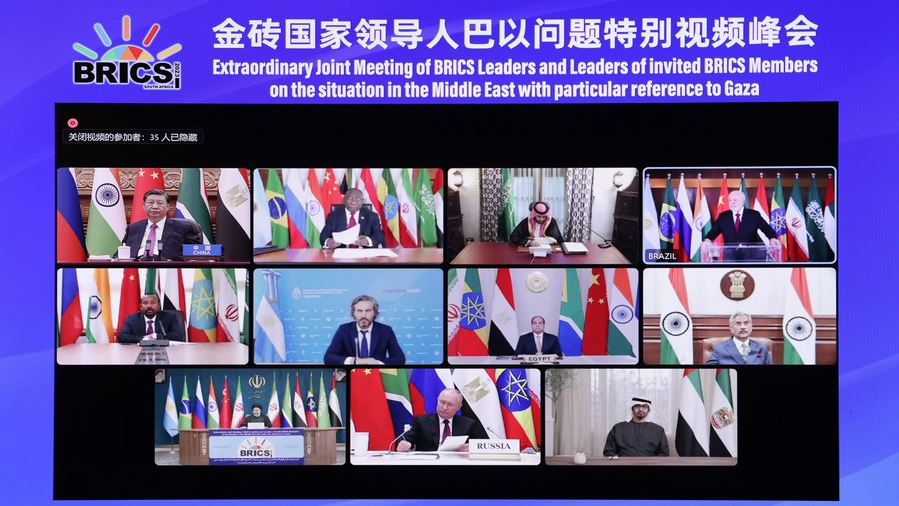
Chinese President Xi Jinping delivers a speech at the extraordinary joint meeting of BRICS leaders and leaders of invited BRICS members on the situation in the Middle East with particular reference to Gaza, November 21, 2023. [Photo/Xinhua]
By Abu Naser Al Farabi
As civilian casualties in Gaza soar, the call for an immediate ceasefire finds little traction in the corridors of Western powers who are among the key backers of Israel. Moreover, there appears to be a glaring absence in discussions regarding durable paths to bringing enduring peace to the region.
Amidst this unsettling backdrop, the BRICS extraordinary virtual summit on the Palestinian-Israeli issue on November 21 emerged as a distinctive beacon of hope for peace. The gathering has not only shed light on the pressing need for a peaceful resolution but also underscored the position widely shared by the Global South in their support for "an immediate, durable, and sustained humanitarian truce leading to a cessation of hostilities."
During the virtual summit, leaders from the BRICS countries convened to address the escalating violence in Gaza. The primary objective of the meeting was to establish a unified and urgent ceasefire in Gaza. In the summit chaired by South African President Cyril Ramaphosa, the leaders reaffirmed their "strong support for regional and international efforts aimed at achieving an immediate cessation of hostilities, ensuring the protection of civilians and the provision of humanitarian aid."
Addressing the summit, Chinese President Xi Jinping reiterated his country's principled position on the conflict that China has consistently called for de-escalation and for both parties to pursue a "two-state solution" that includes an independent Palestine. He emphasized that "only a two-state solution could bring lasting peace."
For an immediate halt to the escalation of the violence and the humanitarian disaster, Xi stressed that Israel should cease inflicting "collective punishment" on the people of Gaza and continue efforts to free hostages and evacuate civilians. Besides, he urged for an international summit to be held as soon as possible to build a world consensus for peace and find a "comprehensive, just and sustained" solution to the question of Palestine.
The summit is highly significant in at least two ways. Firstly, it signifies the unprecedented changes underway within the global geopolitical and power paradigm, with the once prevalent thread of unilateralism progressively losing way to a more egalitarian system characterized by multilateralism. The contours of a new world order are being shaped by the interplay of diverse interests, alliances, and the shared pursuit of global stability.
As we navigate this transformative journey, countries in the Global South are pressing for more coordinated, inclusive, and diversified approaches to addressing global crises that directly affect their destinies. Through the summit, the BRICS, a widely embraced platform representing the Global South on the international stage, has pushed forward the perspectives on the crisis universally shared by the region.
Secondly, the summit's collective endorsement in the pursuit of a "two-state solution" for the establishment of an independent Palestine is uniformly shared by the Global South. The global southern countries have a long history of being crushed under the boot of colonialism and imperialism. This is exemplified by the enduring plight of the Palestinian people, who have been subjected to a form of settler colonialism enforced by Israel and supported primarily by its G7 allies in the Western world.
That is why there is overwhelming support in the Global South in favor of Palestinian self-determination, coupled with widespread censure of Israel's recent offensive on the Palestinian population in Gaza. At present, most United Nations member states, namely 139 out of 192, have extended recognition to the state of Palestine against the expressed wishes of the U.S. and Israel. Those countries encompass almost all of Asia, Latin America, and Africa, collectively called the Global South.
With an unwavering commitment to promoting an immediate ceasefire, safeguarding civilians, and facilitating essential humanitarian aid, the leaders of BRICS have underscored the urgency of collective action during this unparalleled humanitarian crisis. A unified strategy for promoting peace and stability is reflected in the summit's emphasis on supporting regional and global initiatives. Simultaneously, it has subtly communicated a strong message to those who hold onto an arrogant notion that determining how to tackle the world's most pressing problems is the exclusive domain of a select few nations.
Abu Naser Al Farabi, a special commentator for CGTN, is a Dhaka-based analyst focusing on international politics, especially Asian affairs.

 中文
中文



